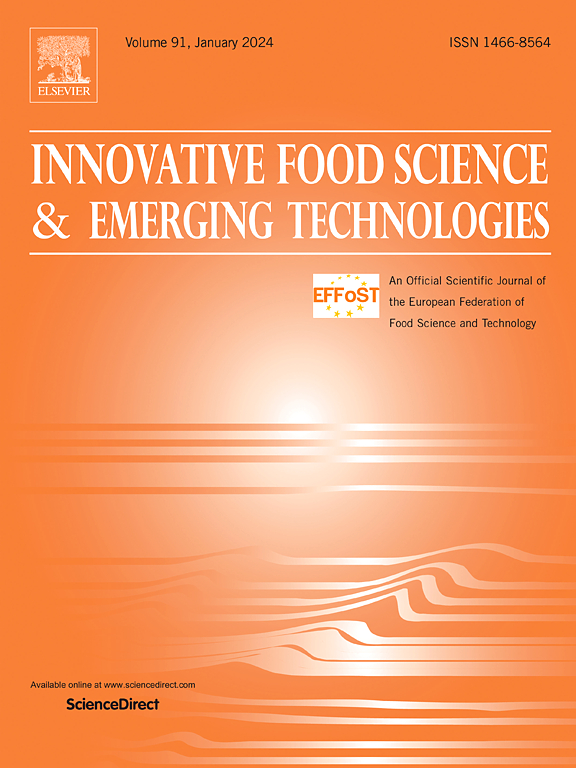椰蛋白复合颗粒稳定的金属-多酚网络介导高内相Pickering乳液:界面重塑行为、稳定机制及3D打印应用
IF 6.8
1区 农林科学
Q1 FOOD SCIENCE & TECHNOLOGY
Innovative Food Science & Emerging Technologies
Pub Date : 2025-09-25
DOI:10.1016/j.ifset.2025.104255
引用次数: 0
摘要
作为一种新型的表面改性剂和界面交联剂,金属多酚网络(mpn)在皮克林稳定剂改性方面的潜力尚不清楚。本研究利用单宁酸- fe3 + (TA-Fe3+)对椰子蛋白-果胶复合颗粒(CP-PE)进行改性,改善其乳化性能,用于稳定高内相皮克林乳状液(hips)。结果表明,在CP-PE和CP-PE- ta - fe3 +表面形成了一层较厚的超分子网络涂层,具有较大的粒径、较低的H0和较好的润湿性。CP-PE-TA-Fe3+能够更快地吸附和锚定在油水界面,形成具有更高粘弹性和力学性能的空间屏障,以抵抗加工环境的干扰。此外,CP-PE-TA-Fe3+稳定的hips具有理想的粘弹性和优异的物理稳定性,使其具有优异的打印适应性和打印精度(“字母E”97.60±0.02 %和“花朵”99.82±0.00 %),成为3D打印的优秀油墨。我们的工作为改善食品级皮克林稳定剂的乳化性能提供了新的见解,并为扩大mpn在食品工业中的潜在应用提供了有价值的信息。本文章由计算机程序翻译,如有差异,请以英文原文为准。
Metal-polyphenol network-mediated high internal phase Pickering emulsion stabilized by coconut protein complex particles: Interfacial remodeling behavior, stabilization mechanism, and 3D printing application
As a novel surface modifier and interfacial cross-linker, the potential of metal polyphenol networks (MPNs) in modifying Pickering stabilizers remains unclear. In this work, tannic acid-Fe3+ (TA-Fe3+) was used to modify coconut protein-pectin complex particles (CP-PE) to improve their emulsifying properties for stabilizing high internal phase Pickering emulsions (HIPPEs). The results showed that the formation of a thick supramolecular network coating on the surface of CP-PE and CP-PE-TA-Fe3+ exhibited a larger particle size, lower H0, and suitable wettability. CP-PE-TA-Fe3+ could adsorb and anchor at the oil-water interface more rapidly, forming a spatial barrier with higher viscoelasticity and mechanical properties to resist disturbances from the processing environment. Moreover, CP-PE-TA-Fe3+-stabilized HIPPEs exhibited ideal viscoelasticity and excellent physical stability, enabling them to serve as outstanding inks for 3D printing with superior printing adaptability and printing precision (“letter E" 97.60 ± 0.02 % and “flower” 99.82 ± 0.00 %). Our work provided novel insights into improving the emulsifying properties of food-grade Pickering stabilizers and offered valuable information for broadening the potential applications of MPNs in the food industry.
求助全文
通过发布文献求助,成功后即可免费获取论文全文。
去求助
来源期刊
CiteScore
12.00
自引率
6.10%
发文量
259
审稿时长
25 days
期刊介绍:
Innovative Food Science and Emerging Technologies (IFSET) aims to provide the highest quality original contributions and few, mainly upon invitation, reviews on and highly innovative developments in food science and emerging food process technologies. The significance of the results either for the science community or for industrial R&D groups must be specified. Papers submitted must be of highest scientific quality and only those advancing current scientific knowledge and understanding or with technical relevance will be considered.

 求助内容:
求助内容: 应助结果提醒方式:
应助结果提醒方式:


